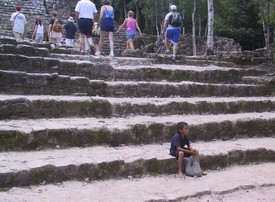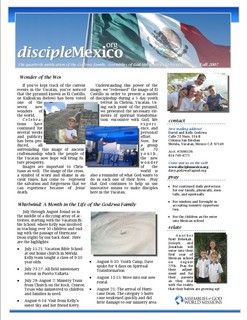The first in a series of evangelism training classes to be held at Verbo de Dios in Mérida, Yucatan
The definition of missions is changing. I recently returned from the Mission Exchange fall retreat where it was obvious that the upcoming generation of leaders thinks differently about the way cross-cultural ministry should be done. One speaker put it plainly. “To me a missionary was a guy in a four pocket shirt (guayabera) who traveled with snake skins and a slide projector.” He couldn’t relate. In a context of rapid globalization, where the world seems to be shrinking by the day, more and more students and professionals are saying, “Missions? Hey, I can do that!” They’re an eager workforce looking for the right project or missions-sending agency with which to partner, and when they can’t find one, they’re making their own. One pastor, Matt Chandler from the Village Church, looking to implement a business as mission model grew impatient with his denominational organization and started his own organization which is funding 14 missionaries and a handful of missions projects in several countries.
“To God be the glory, more workers in the harvest!” might be the reaction to the current situation, but such trends give this missionary pause for thought. The church today has, to a certain extent, adopted the current business mentality. For a project to be successful, it needs to produce quick and substantial results. ROI, or Return on Investment, a term ripped out of the business manager’s handbook, was thrown around a bit at the retreat. Donors are looking to see their dollars make a tangible impact on a community, so the funding of hospitals, feeding programs, orphanages, and even the establishment of Christian Businesses are becoming increasingly popular. Still, the question remains, “Is this the best way?”
My time here in the Yucatán has shown me that the work of a missionary is never quick nor easy. What may be able to be started through a project or an event must be continued through sustained process–biblical concepts applied to the cultural situation. This requires someone on the ground, an interpreter. This role was the one that the missionary traditionally occupied–studying the language and culture in order to reveal Christ and the Christian message through concepts that could be understood and adopted. I don’t put myself at this level yet. We have much to learn to fully understand the culture in which we are ministering, but I feel that we are making progress.
For example, these past two weeks I’ve carried on redemptive conversations in three separate settings, one a meeting to minister to a hurting woman, another a conversation about discipleship over lunch, and finally an impromptu chat with a carpenter at the local library. In each setting, through an understanding of the linguistic, cultural, social context, I was able to determine the relationship that the individual had with Christ, move them further along in the discipleship process, and, because I live here, follow up with them to clear up uncertainties or integrate them into the local Christian community. This doesn’t bring about the headline worthy results of a evangelistic crusade or a medical missions team, and often a cup of coffee or a chat on the beach doesn’t “look” like ministry, but statistics show that, over the long run, this is the most effective strategy (McIntosh, Finding Them Keeping Them, 1992:45). In reality, this is where cultural exchange happens, where we can study, share, and begin to understand one another. This is not to say that we are no longer preaching, teaching, or planning events, but we find that it is in the follow-up, the relationships that we find that we make the most progress toward discipling Mexico.
The “new” trend in doing ministry has its place, but we must understand the risks involved:
- Disaster relief, though a biblical mandate can lead to the creation of “Rice Christians” those that proclaim Christianity as long as the hand-outs keep coming.
- The construction of hospitals and schools require funding and resources that the host nation usually cannot provide and government instability can lead to such properties becoming pawns in a civil war.
- Business as mission, or the creation of Christian businesses overseas as a means of witnessing through Biblical business practices runs the risk of tying Christianity to capitalism and the possibility of major problems in the event that the realities of business causes the mission to pull up its roots and abandon the country in search of a more profitable location.
The reality is that incarnational ministry, “walking among the people” is the only real method to effect change in a culture. Programs pass away, and events come and go, but it is my hope that the presence of the missionary and the example of the ambassador of Christ in the cross-cultural context will remain.
Our missions organization, Assemblies of God World Missions (AGWM), promote a missions policy that seeks to create and nurture an indigenous national church. Therefore, we as missionaries are charged with the task of forming or motivating national churches that are to be self-propagating, self-governing, and self-supporting. What does this mean you ask? Simply, our job is to partner with the church in Mexico–working, modeling, and training, so that they can, with their own people and resources, evangelize the lost and disciple new believers, administrate the work, and fund the church.
If you noticed, the order is intentional. Often, a new work moves forward quickly in the area of propagation. New believers are eager to share with others about the new-found freedom that they have in Christ. Leaders are harder to come by. Time and training are required to cultivate those who would guide the fledgling work. Still more challenging though is reaching the point of self-support. In developing countries like Mexico wages are low (the minimum wage here in Mérida is $5 a day), and the requirements of ministry can be quite high, especially if the church wishes to take an active part in evangelization and outreach to the community in which it is located. Therefore, missionaries often find themselves called upon to lend a hand when it comes to stimulating the work.
This is the reason that I am writing today. Our home church is in need of a helping hand to meet its needs as it expands to reach out to the community. Pastored by Orlando Vazquez, El Centro Cristiano Gólgota, is located in a strategic area of the city, but it’s current size is affecting its ability to minister effectively. Therefore, the church has been expanding its facilities to keep pace with its vision.
The $55,000 expansion began in mid-April with about $10,000, not even a fifth of the required need, but, through the sacrifice of the congregation and the response of friends and the community, Gólgota has finished walling in, roofing and is currently using the lower portion of the expansion where the sanctuary sits. It indeed has been a blessing to see the response of the people as they have challenged themselves to move forward. Still, about half of the work remains, including classrooms to minister to the bulging children’s Sunday School classes.
That’s where we are asking you to consider pitching in. Kelly and I have seen the kind of contagious motivation and sacrifice that the congregation has displayed, and we would like to offer you a chance to participate. So we have created, as a project with AGWM, a fund in order to receive offerings from those who would like to help Pastor Orlando fulfill his dream of seeing the church built.
If you would like to donate directly to this work, you can give through this secure web-server by entering your offering and the project name and number “EXPANSION OF CHURCH BULIDING GOLGOTA #14290.”
Celebration of the rebellion of Miguel Hidalgo on September 16, 1810 that eventually resulted in Mexican Independence from Spain in 1821.
Opening service for Bethel Bible Instititute’s new school year at Sinai Faith Center, Mérida, Yucatán.
Pastor: José Ventura
Dave will be preaching during the Evangelistic Service Golgotha Christian Center, Mérida, Yucatán.
Pastor: Orlando Vázquez Interián
 Need. It confronts. It demands to be met. Take for example a stone in our shoe. Even the tiniest pebble can cause reduce our gait to a hobble. What’s the response? Well, it’s impossible to negate, and limping to avoid the stone usually only lasts a few steps. Basically our feet demand that we sit, take off our shoe and get rid of the stone.
Need. It confronts. It demands to be met. Take for example a stone in our shoe. Even the tiniest pebble can cause reduce our gait to a hobble. What’s the response? Well, it’s impossible to negate, and limping to avoid the stone usually only lasts a few steps. Basically our feet demand that we sit, take off our shoe and get rid of the stone.
Here in Mérida, poverty is a need that demands to be met. The poor stand in doorways and wander the streets looking for those who will help them out of their situation. Even those that do work are trying to make ends meet on $5 US each day, and unlike the tourists in the picture above, we can’t leave their need behind when we return to our hotel or board our plane.
After my run in with the Ronald, the con-artist that took us for $8 in Costa Rica, I searched for a way to avoid the needs. I believed that a policy would help protect me, or maybe I would be able to direct people to ministries that could lend them a hand in their situation. Still, the need kept nagging.
Reading the Bible didn’t help either. Jesus, when confronted by the clamoring masses, would usually reply, “What is it that you want me to do for you?” He had no policies, no list of places to which he could direct them and wash his hands of their problems. He was personally involved–feeding, healing, touching.
Today, I was on a search for some items to get our house finally set up. Taking the wrong way to get to Home Depot, I stopped at a local hardware store. In the parking lot, there stood Raul, a disabled, middle-aged man, who, along with his wife, had been looking for garden work so that he could pay for his kids’ school supplies and uniforms. He asked me if I could help him. My schedule was free, but my impulse was to say that I couldn’t. After all, I had just cut my lawn the day before, and my ministry is equipping not compassion. Still, his need was clamoring for attention, and the example of Jesus from my devotionals was fresh in my mind. “What do you want me to do for you?” I asked.
I decided to get personally involved. I talked to him and called one of the references that he had given me. Then I spent the next 30 minutes praying and driving them to the places that they needed to go. As we said good-bye I gave him about $20 towards the uniforms and some dry goods that we had been carrying in the car so that his family would have food to eat. He gave me his address and an invitation to visit him.
Did I do the best thing? It’s hard to tell. I would rather have taken him to buy the shoes and uniforms that he needed, but at that moment I couldn’t. So perhaps I settled, or perhaps I was used as one response to the prayers of a desperate couple with a need that wasn’t going away.
Photo Credits: “Left Behind” a photo taken by gerriet available at: https://www.flickr.com/photo_zoom.gne?id=43491111&size=l and used under a Creative Commons License
 Our print newsletter is on the way to press, but you can get the electronic copy here at disciplemexico.org before everyone else. Just click here or on the photo to get up to date.
Our print newsletter is on the way to press, but you can get the electronic copy here at disciplemexico.org before everyone else. Just click here or on the photo to get up to date.
Remember, in order to read the newsletter, you’ll need Adobe Acrobat reader, which is available for free.
 What can we say except, “Thank God for his protection!” as we assess the situation here in the Yucatán.
What can we say except, “Thank God for his protection!” as we assess the situation here in the Yucatán.
The facts are plain:
- Dean was a category 5 hurricane, the highest on the scale of hurricane strength.
- It made landfall with a sustained wind speed of 165 mph the first since Andrew to do so.
- Dean is now among the top 10 strongest hurricanes on record at landfall.
- Storms of the magnitude of Dean have the potential to be catastrophic. Andrew, for example, caused 65 fatalities and 38.1 billion dollars worth of damage in today’s economy.
Still the final results are nothing less than miraculous:
- To date no fatalities have been directly blamed on Dean here in the Yucatán
- Upon landfall, the storm rapidly lost strength and caused what President Calderon has said was “minor damage.”
- The Diario de Yucatan (Spanish) called Dean a “dry hurricane.” Most populated areas received high winds but little to none of the rains that were expected to cause flooding across the peninsula. Our contact in Muna, Pastor Julian Puc, held service that same night, while Pastor Santos Reyes, who is in Ciudad del Carmen where the hurricane left the peninsula, has told me that everything is functioning “as normal” after only 24 hours without electricity.
Everything from the landfall over a less populated area, to the speed in which it passed over was beneficial for the inhabitants of the Yucatán.
Again, thank you for your prayers on our behalf and that of the people of Yucatán. Also, thank you to those who wished us well through e-mail, phone calls, comments on our site, and links highlighting the situation. We appreciate each one of you.
Faculty meeting at Bethel Bible Institute
Director: Silverio Blanco




